- Home
- Kim Newman
An English Ghost Story Page 14
An English Ghost Story Read online
Page 14
She called the Letter to her.
And it was in her hand.
Yes. She shouted silently, holding up the Letter like a winning lottery ticket.
Even the moor sided with her.
She found a box set into a drystone wall. Black in the night, red under daylight. She posted the Letter.
Done.
She must be in the village, though no buildings loomed in the dark. She also had the idea that she hadn’t taken the usual road here.
It didn’t matter.
She walked back to the Hollow and was home in a trice.
* * *
From his observation post, he saw the truant return. He would have preferred to take a position inside Green Base. A sleeping bag could easily be jammed into the trunk, making a nicely padded foxhole. That would involve leaving the house, which meant negotiating the creaky stairs outside the parental bedroom. However, his OP would do. He had picked his room in the first place because it commanded the high ground.
Once the night’s story was done and the MP had seen him safely tucked in bed, he had counted slowly to a hundred, then got out from under the duvet and fixed up his OP. By the window was a half-sofa, a couch about his length with a rail-like back and single side. Mum said it was probably the survivor of a pair, but its broken-off arrangement suited him. He could get back support and let his legs stretch out, feet dangling. With his duvet wrapped around like a blanket and two pillows under his head, he was cocooned in a space by the tower window, close enough to the glass that his cheek felt the cold coming off it. The window faced the other tower, the smaller one. He had a view of the drive and the road and the orchard and the moor.
He caught quick naps during the day and night when he could, to be alert when he needed to be. Any wrong movement snapped him out of a doze.
The truant had left the Hollow less than an hour ago. He’d watched her trudge down the drive to the road. She came back walking differently, her arms not awkwardly clamped to her sides, as if she had got the hang of wearing her new dress. She didn’t return by the road, but appeared out of the orchard, startling him. He couldn’t work out her route, and was annoyed with himself that he hadn’t spotted her the instant she breached the perimeter.
What was the BS doing?
The U-Dub was in his hand. A detachable pane in the window made a firing port. He would not normally have cocked the weapon for a routine watch, but at DefCon 2 it was vital to be prepared for any attack.
DefCon 1 was war.
He pulled back the U-Dub and sighted on his sister.
The BS didn’t immediately come into the house, but lingered in the orchard – passing out of his sight for tense seconds – and wandered, with apparent lack of urgency, out to his HQ.
Tim had concluded his sister was behind the first incursion. The MP and the PP were too caught up in their own protracted peace talks to risk an incident over mere territoriality.
What would she do?
His arm was tense.
The BS stood among the trees and curtsied, raising her skirts and dipping like a dancer, bowing her head. Was she communicating with the IP or anyone else? He didn’t want to believe she’d gone over to the hostiles, but she had form. In London, she’d always been an iffy prospect, weak and strong at the same time, hard to predict. At times, she was in his corner with commitment and vehemence, shielding him from the fall-out. At others, she was on his back like a vulture, jabbing and clawing with words and fingers. Seventy-five percent reliable wasn’t good enough.
He was sorry, but that’s the way it was.
A vital truth that the IP had conveyed to him was that people didn’t change, they just became more themselves. As time went by, it got harder and harder to pretend.
The BS seemed to be dancing with herself. Innocent enough. Not a week ago, the FU had all danced together, with the IP, during the grand summit. That had felt like permanent peace. Now, it looked like a mere armistice, and a shaky one at that.
Suddenly, his sister stopped dancing, pulled up her dress and squatted by Green Base. He saw the shining stream. She was pissing where he lived.
Anger made him loosen his hold on the U-Dub.
He nearly fired the first shot. He would have been within his rights.
But he took the advice of the IP C.-in-C., the Ipkick.
Not yet. He wasn’t resourced for all-out war. But at DefCon 2, a guerrilla campaign was permissible.
He rolled away from the window, having seen enough, and let himself go to sleep, plotting…
* * *
Her old bank phoned in connection with the Oddments account. A stray £35.79 in charges needed to be paid before the account could be closed. Kirsty was puzzled for a moment when the woman referred to ‘your letter of yesterday’, then went utterly cold. She promised to send a cheque for the outstanding amount and hung up.
That was the end of that.
She couldn’t remember a letter. There had been so many back-and-forth recriminations. It was probably something from last week or last month that had only just got to the woman’s desk. If she could bring herself to sit through the inevitable lecture, she would ask Steven; the mess had been turned over to him to sort out. As a little boy, had he seen Mary Poppins and identified with the stuffy bankers who suggested pocket money should be invested rather than going to feed the birds?
She sat in the Summer Room, surrounded by real antiques (in shocking, unrestored condition which made her love them more than the waxed and show-polished pieces her elves had sought in lock-up garages under railway arches) and said a private goodbye to Oddments.
It had seemed like an escape, an opportunity, but turned out to be a disaster, a millstone. But it had been hers, a real business. She had a degree, she had work experience, she was not a housewife. After all, she wasn’t exactly an ideal home-maker, so she had to be something else. There must be something at which she was excellent. As a girl, she’d been told that everyone was outstanding, everyone a star. You just had to find that thing at which you shone, and the world opened up its glories like a vault when the correct combination clicks.
Steven never said how much Oddments had cost him. Whenever he went through the fiasco, he talked about how much debt ‘we’ were in. But she knew what he felt. It was Kirsty being silly, running up frivolous debts, never thinking it out. If it hadn’t been for the surprise pay-off that had let them buy the Hollow, his business might have gone under with hers. Then, she was sure, he would have cut her and the kids loose, and set himself up with Tatum Hoyle in a new partnership.
Before antiques, she had done other things: run an indie label that hadn’t put out its first record because Vron could never finish mixing her debut album as a singer-songwriter, invested in the importing of a Czech beer whose shelf life was up by the time the first vanload was in Britain. Once Tim was old enough to go to school, she’d taken courses in business studies, law (when she had wanted to be a lawyer, specialising in child custody cases) and radio production (when Vron thought she could get a community broadcasting licence). She’d even completed some.
Repeatedly, she had tried to make a space that was hers alone. She knew Steven thought of these projects as crazes. When she was setting up Rose Records, just after Jordan was born, he was enthusiastic and helpful, even securing some investment from his clients. The label’s long, unproductive fizzle bled his belief in her out of him. Subsequently, he was polite but elaborately long-suffering. He’d never shoot her ideas down, instead sabotaging them with a few tiny phrases. Vron said Steven’s favourite sentence was ‘Yes, but we have to be practical.’
Everyone was right: Vron could be a monster and had wrecked lives. But Vron was her friend, her healer, and always ready to commit to anything Kirsty thought of. She missed Vron, missed having her around for coffee, endless gossip and the occasional joint (last gasp of her student habits), missed having someone outside the family to complain to. If she were here, Vron would be nagging Kirsty to go through with her i
deas about the Hollow, not imposing caution on her. Steven was her husband and said he loved her without conditions, but a sensible part of him shut her out. Vron would encourage her in anything, no matter how ‘impractical’ or even insane. She understood how important it was that Kirsty have a life of her own. Steven’s downer attitude had passed to Jordan and Tim. Flat expressions came on the kids’ faces whenever Mum was going mad. They’d just get out of the way until it blew over.
To Vron, nothing ever would blow over.
She hadn’t talked with Vron since before the move. It had been a condition of what Tim called the peace treaty, that her best friend be cut forever out of their lives. They were all making sacrifices; but why had hers been a person, rather than a thing? The office Steven left behind had no feelings of its own. Kirsty had been expected to drop Vron as easily as she let her subscriptions to motivational magazines lapse.
Vron and Kirsty had spent some part of the day together for over twenty years, since they first met in the fifth form.
She must be in an agony. Or was she?
Vron always asked about other people’s feelings, never confessed to any of her own. She had exes, a daughter, a sister, other patients, an extended network of friends and pick-ups. When she was with Kirsty, she never thought of them, never talked about them. She would always focus exclusively on Kirsty. She said Kirsty should have a sealed-off compartment in her mind, to keep her own self separate from her family.
Which would be worse? Vron wandering the streets bereft, fading to ghostliness without Kirsty, or Vron continuing as normal, occasionally reminded of her lost friend but getting on with the tangle of her own life?
Vron didn’t have a telephone. The twentieth century was nearly over, but she didn’t believe in phones or faxes or e-mail. She said machines got in the way of real communication. Aside from face-to-face meets, at which her eyes would unnervingly fasten on Kirsty’s and penetrate her heart, Vron’s preferred means of communication was a postcard. Kirsty had been getting postcards almost every day for years, with notes reminding her of appointments, visits and things to do. Vron would send cryptic clues which took hours to solve (at school, they had both been crossword-puzzle and Agatha Christie fiends) or runic symbols whose meaning was only clear when they were added up and looked at sideways and sometimes not even then.
Apart from the books – words from other people endorsed by Vron – there had been nothing. They were both cold turkey.
The books, though. They meant Vron hadn’t forgotten. The second, Ghost Stories of the West Country, meant she was thinking of Kirsty and the Hollow. She wasn’t completely shut out of new developments. Without having set foot here, she’d made discoveries.
Kirsty knew Vron understood this place. Perhaps better than any of them did yet.
She was keeping Vron in reserve, knowing she might need to summon her in the end. There were powers in the Hollow and Vron was used to dealing with powers. Steven and Jordan called her a witch, though that wasn’t true. It was funny that her husband was trying to cope with their magical house by deploying all his Steven-sense. This place was made for the intuitive, logic-defying, lateral-thinking mind of women he would call witchy. If she was to make the best of the Hollow, she needed to be more like Vron and less like Steven.
It hit her that she would have to tell Vron about the Oddments account; she was an additional signatory and might still be getting letters from the bank. There was the matter of that £35.79. If Vron were here, she’d tell Kirsty not to pay, to let the bank yowl for their pennies. They weren’t going to sue over the price of a few bottles of shampoo.
‘I need someone’, she said, out loud, ‘to talk to.’
The room hung there, solid, empty.
She had thought there might be friends here. Like the friends who worked the magic chest of drawers. The presences who had called them out into the orchard at midsummer. The girl in the little shoes who had shared her rage.
‘I’m sorry,’ she said. ‘It’s just Kirsty being silly.’
‘You shouldn’t say that.’
She jumped, almost out of her skin, and turned.
‘Jordan?’
A woman had spoken. It was not her daughter.
Her friend was in the fireplace, in shadow. A little girl in Drearcliff Grange uniform, with an adult’s head, deeply lined face and waist-length, grey-dusted black hair. Her straw hat hung around her neck. She had Vron’s eyes, which glittered in the dark.
‘Who are you?’ Kirsty asked.
‘Who you need me to be.’
The voice was a little like Vron’s, a little like Jordan’s, a little like the woman who had read the Weezie books on the wireless when Kirsty was a little girl. Her friend also sounded like that voice Kirsty was always embarrassed by and refused to recognise: her own, recorded and played back. Herself, not as she was in her own head, but as others heard her.
This was a ghost. Not Apple Annie or the Gloomy Ghost. The ghostness was more important, somehow, than of whom she was a ghost.
‘Are you Louise?’ Kirsty asked, wondering. ‘Her ghost? Or are you Weezie?’
The old girl shrugged. That was who she was, the Old Girl. Not Louise or Weezie, but something of both and something older. And, in the echoes of Vron and herself, she was Kirsty’s ghost. Shaped especially for her.
She ought to be scared, she supposed. Even after all that had happened at the Hollow, this was unexpected. Back in the city, Steven would have written it off as the type of weirdness Vron was always polluting her with. But the family were settled here.
Kirsty sensed an escalation. Her earlier communications with what Tim called the IP were through the things in the drawers or in wordless wonder. The Old Girl was talking with her, adopting her means of communication, taking a step out of the shimmering to be with her.
‘Why have you come?’ Kirsty asked.
‘I am here for you, Kirsty.’
The Old Girl knew her name. She was not just a hologram or photograph, cast off by strong emotion, but a being who could think for herself. This creature had a personality, a mind, a purpose.
‘You need me,’ the old girl said. ‘You know why.’
The Old Girl kept to her place, but Kirsty saw her more clearly.
‘You are my special friend,’ she said.
The Old Girl nodded, gravely.
Kirsty felt a melting burst of relief and love. She would never be alone at the Hollow, alone in her family. Always, there would be someone in her corner, giving her strength.
She wasn’t haunted. She was protected.
* * *
Jordan woke up, not knowing what time it was, and crawled out of bed. She still wore the dress, which hung loose on her like the skin of a dieting sumo wrestler. It was her reward. She wriggled out of it, bundled it up, and threw it into the wardrobe, pushing it to the back. She wouldn’t need it again. She was ready for the next size in, the lovelier dress still. A look in the mirror revealed she was still unsightly. Flesh still moved independent of her bones, but there must be some improvement. Posting the Letter had been like shedding a burden. Evidently, it involved losing weight too.
She remembered something the Wild Witch said about not being able to fix your body until you’d fixed your mind. One thing you had to give her was that she was slim. She hadn’t put on a pound since her teenage years. Mum’s weight went up and down like a yo-yo, along with everything else, but Veronica – even as a child, Jordan hadn’t liked to call her Aunt Vron, as Mum sometimes insisted – never changed. Perhaps there was something in witchery after all.
At the Hollow, there was magic. Jordan knew and accepted that. It had surprised and delighted her at first. Now she lived with it every day and wanted something more. The mere fact that there were wonders in the world, that she was privileged to see the curtain of reality lifted a little, had been a passing distraction but nothing was changed. She still had to live, to better herself, to cope.
It was mid-afternoon by her clock.
She’d slept away the morning. She popped a couple of aspirin for her head, washed down with Evian water from her secret stash. No one could say she hadn’t had breakfast.
She patted her belly. It was grossly huge, but didn’t feel empty. During her first great struggle with her body, hunger had been like a rat chewing inside her stomach. This time, she had help. She felt fine. Even the headache was gone, as if she were living in an advert.
Rick would not yet have the Letter. She’d missed yesterday’s last collection, but it would have been picked up from the postbox first thing this morning, hours ago while she slept, and was now in the trusty hands of the Royal Mail. Tomorrow, Saturday, the letter bomb would go off.
Then she’d never think of him again.
She found jeans – too tight, argh! – and a floppy T-shirt with thin-making vertical stripes. It was time to leave her room and recommence negotiations with the rest of the family. They’d take some selling, but she had everything straight in her mind. Her only problem was a need to lose a little weight by the end of the summer. She wanted to be presentable by the first day of her new college. She did not have a disease, she had a goal.
To compromise, to lull her parents along, she would accept a cup of tea. But no biscuit. Custard creams and chocolate digestives were streng verboten.
She opened her bedroom door. A semi-circle of dead shrews greeted her, red showing in stiffened grey fur, toothy blank-eyed heads pointed at her doorway, ratty tails carefully extended. She hesitated to step over the fan of tiny corpses.
It was a sign.
She shut the door and sat on the bed, feeling sick.
* * *
Tim conducted a series of U-Dub test firings, sighting on a diamond-shaped pattern of knotholes in the wooden door halfway up the side of the barn. After five shots, he was accurate to a hundred feet. He pulled back a further ten feet, deeper into the orchard, got the range again, set his stopwatch going, and fired off, rapidly reloading between pulls, another five pebbles in sixteen seconds.
Three hit within the diamond. Worth ten merit points, easily, but he wouldn’t rest until all five shots went true. It was down to him now, not the magic. He couldn’t let his allies be a crutch.

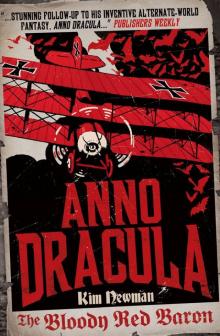 The Bloody Red Baron
The Bloody Red Baron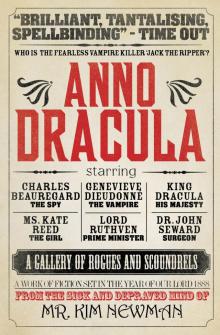 Anno Dracula
Anno Dracula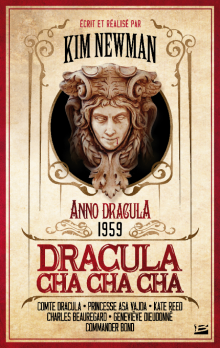 Dracula Cha Cha Cha
Dracula Cha Cha Cha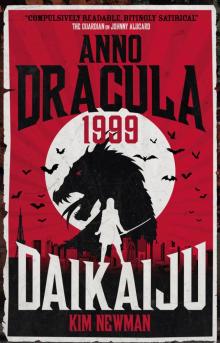 Anno Dracula 1999
Anno Dracula 1999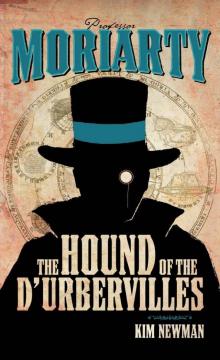 Moriarty: The Hound of the D'Urbervilles
Moriarty: The Hound of the D'Urbervilles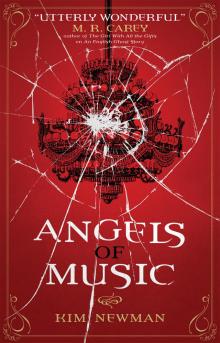 Angels of Music
Angels of Music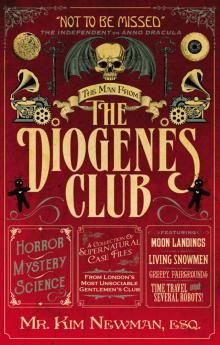 The Man From the Diogenes Club
The Man From the Diogenes Club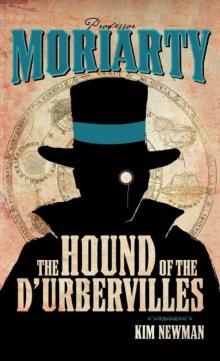 Professor Moriarty: The Hound Of The D’urbervilles
Professor Moriarty: The Hound Of The D’urbervilles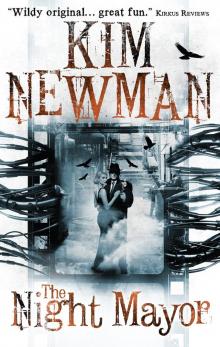 The Night Mayor
The Night Mayor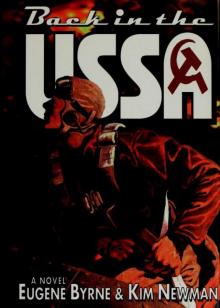 Back in the USSA
Back in the USSA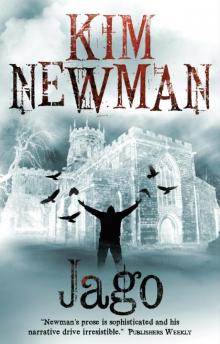 Jago
Jago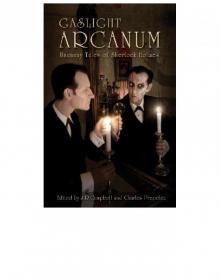 Gaslight Arcanum: Uncanny Tales of Sherlock Holmes
Gaslight Arcanum: Uncanny Tales of Sherlock Holmes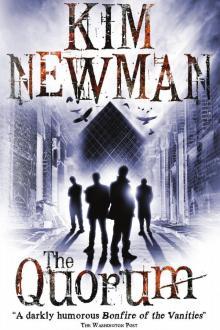 The Quorum
The Quorum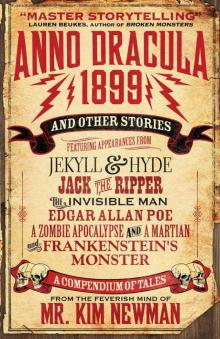 Anno Dracula 1899 and Other Stories
Anno Dracula 1899 and Other Stories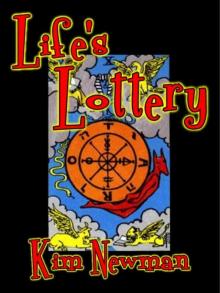 Life's Lottery
Life's Lottery The Secrets of Drearcliff Grange School
The Secrets of Drearcliff Grange School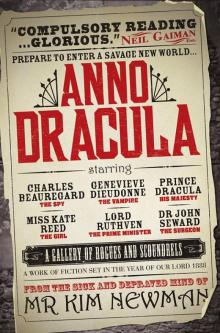 Anno Dracula ad-1
Anno Dracula ad-1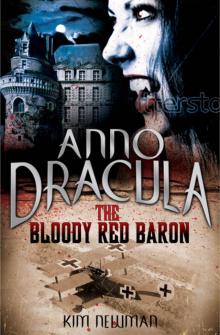 The Bloody Red Baron: 1918 ad-2
The Bloody Red Baron: 1918 ad-2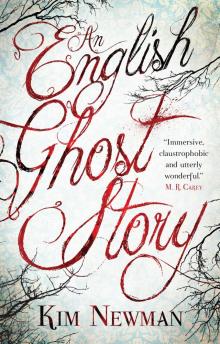 An English Ghost Story
An English Ghost Story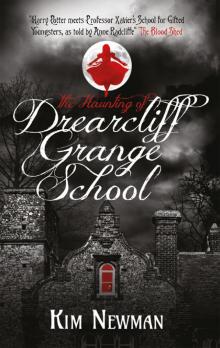 The Haunting of Drearcliff Grange School
The Haunting of Drearcliff Grange School The Other Side of Midnight
The Other Side of Midnight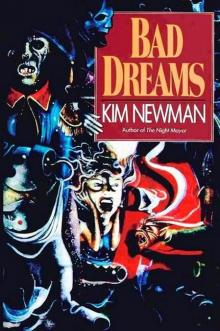 Bad Dreams
Bad Dreams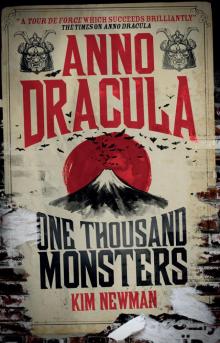 Anno Dracula--One Thousand Monsters
Anno Dracula--One Thousand Monsters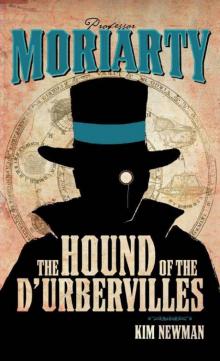 The Hound Of The D’urbervilles
The Hound Of The D’urbervilles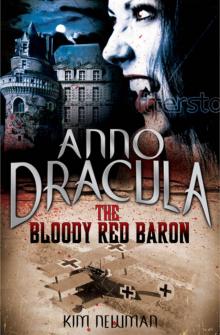 The Bloody Red Baron: Anno Dracula 1918
The Bloody Red Baron: Anno Dracula 1918